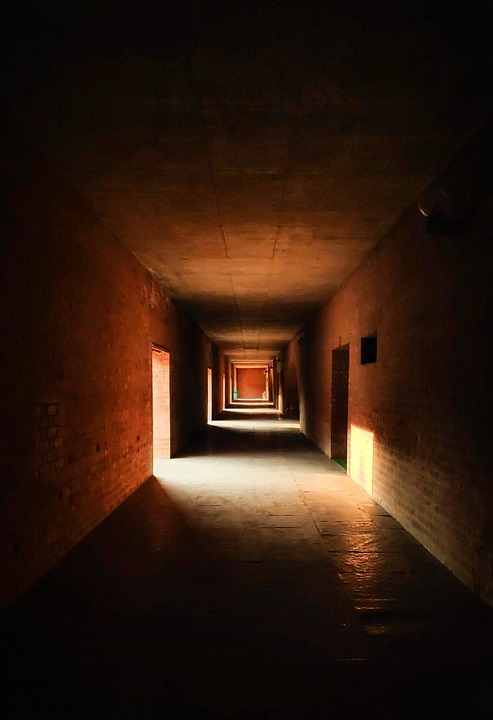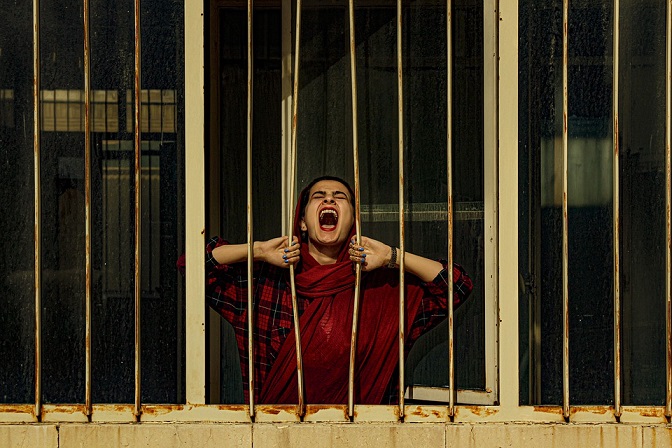“I just wanted to flee my country,” said Makni Tecli a 30 years old Eritrean asylum seeker who has spent 8 months in detention. He fled his country to Sudan in 2001 because he was a draft evader. The Prisma’s memoirs.
 Joanna Gilbert-Shcrute
Joanna Gilbert-Shcrute
“The prison sentence in Eritrea for draft evasion is open-ended and is at the discretion of the President and the prison officers, there are no judges in military matters.” Penalties for desertion range from imprisonment to the death penalty.
Eritrean draft evaders are commonly tortured and physically abused. Those detained are often held incommunicado indefinitely without formal charge. Draft evaders are commonly tortured, raped and physically abused. From October 1995 national service of 18 months was compulsory for all Eritrean citizens male and female aged between 18 and 40 years old, although Makni claims that it is up to 50 years of age in reality. National service has intensified and often now extended indefinitely due to the ongoing border dispute and corresponding fears of rising tension with Ethiopia.
Makni is physically restricted but mentally determined to overcome the various obstacles he has encountered on his path to asylum. He has hop scotched in to oblivion, since fleeing Eritrea in search of asylum, with the stones determining his destiny constantly being cast not by himself but by the immigration authorities.
The last time that Makni felt a sense of power to exercise choice, he was packed in a military truck at night during a heavy downpour of rain where conscripts were commanded to transfer to another truck.
Makni explains with the conviction of an opportunist that “I seized this moment to run away.” Well aware of the repercussions of his actions, he took a chance.
He deeply disagreed with the Eritrean government and indefinite conscription in a brutal army regime. He escaped as far as Sudan and from there to Libya and then Malta, where he was put in to detention until the beginning of October 2002 when he was sent back to Eritrea, the very country he was trying to escape from.
 Immediately sent to prison upon arrival Makni decided he would not stay in Eritrea for long. He soon attempted to escape from his incarceration in the low walled insecure prison he found himself in. He managed to successfully escape and reach the border of Sudan where he was assisted by smugglers in to the country.
Immediately sent to prison upon arrival Makni decided he would not stay in Eritrea for long. He soon attempted to escape from his incarceration in the low walled insecure prison he found himself in. He managed to successfully escape and reach the border of Sudan where he was assisted by smugglers in to the country.
By becoming involved in the Eritrean network in Sudan, Makni was introduced to an agent who would help him to get to the UK. “I had no papers or identity, unlike refugees who have UNHCR papers and are accepted by Sudan as refugees.”
Eager to leave Sudan due to the undercover Eritrean security patrolling the area, Makni decided to invest and trust in the agent and his future. “If I was returned a third time, I feared the indefinite sentence or death.”
When he arrived to the UK in 2004 with no papers of his own, but carrying a forged passport, Makni was imprisoned for 7 months and was immediately transferred to Campsfield detention centre for 4 months. In total Makni has spent 8 months in detention in the UK, at Colnbrook and Oakington detention centres as well as Campsfield.
With varied experiences of 3 detention centres in the UK Makni describes the strongest experiences from each centre rather than a comparative analysis of them. He tends to compare his prison experiences to his detention experiences, favouring the former over the latter. “Prisons are better than detention centres. Even though one is deprived of rights, you know you’re doing your time and you’re treated like a citizen…. also the food is better” admits Makni.
In detention centres “no one knows when they’re going to be released. It’s hard to find an answer to anything you ask. Even though the atmosphere is more relaxed than in prisons, it is rife with problems,” he slowly adds “not having information is the hardest thing to bear, the limbo and uncertainty.
 In UK you don’t know when you’ll be released. I don’t like my life to be in limbo in this country, not knowing what is going to happen next.”
In UK you don’t know when you’ll be released. I don’t like my life to be in limbo in this country, not knowing what is going to happen next.”
When describing Campsfield detention centre Makni mentions how the officers would regularly handle Afghan detainees with force. “Many detainees that are taken to be deported but it fails, are beaten when they return, with a delay sometimes, in order to hide the beating.”
Makni describes that “In prisons there are maximum 2 people in a cell, in the detention centre there can be 12 people in a room, making it harder to get sleep among people snoring, talking and the smells”.
“Colnbrook is different to the other detention centres, as it is more short term. You’re locked up for 23 hours; with only a 1 hour break” Makni sighs. He continues “It’s similar to isolation where people who are going to be deported or who have just been released from prison are taken. The main purpose is to break you down psychologically so that you’ll willingly be sent to wherever the authorities wish to send you, i.e. another detention centre, or for deportation”.
A Home Office spokesperson stated that “We may occasionally hold them in separate accommodation the night before their return where they are being collected very early, to minimise the disruption to the rest of the centre.” Considered responses from Makni are arresting and belie his strength of spirit required to endure the hardships of his journey. His striking features and gentle articulate voice betray his life experiences.
Makni believes the system is infected with incompetence. Makni’s court hearing is starting in August and he has applied for asylum twice due to bureaucratic negligence. Not only have the Home Office claimed to have lost the file for his 2nd asylum application but he has had court hearings postponed in the past. Makni protests that the Home Office are wasting tax payers’ money by constantly postponing his hearing, not the asylum seekers. “But I, the asylum seeker will be blamed for wasting tax payers’ money!”.
He continues passionately “the Home Office has the authority to issue “sanctions” on the individual by limiting their movements. They are not a court, yet they do what they want, even saying “we lost your file.”
 The Home Office described the Government’s newly established Asylum Improvement Project when we highlighted allegations of negligence to them.
The Home Office described the Government’s newly established Asylum Improvement Project when we highlighted allegations of negligence to them.
This project was launched in the summer of 2010 and is outlined to explore new ways to improve the current asylum system, including processing asylum cases faster, at a lower cost, and improving the quality of the UK Border Agency’s decision making.
Makni says that “Immigration authorities in the UK don’t fight you with force; they fight you with paper work that makes it impossible for you to argue or defend yourself”.
Makni also complains that when your asylum claim fails, the report given by the Home Office writes about “articles that are incomprehensible”.
Another problem he sees is that immigration lawyers are incompetent and only those that work with the immigration authorities are willing to work.
The Home Office have a deportation order on him, but have failed to deport him because they cannot obtain documents to identify him or his country of origin. It is therefore difficult to prove that Makni is in fact Eritrean.
Upon release from detention Makni was told that he would be tagged and “dispersed” to Birmingham. He did not agree to this because any support network that he has exists in London. “I survive with the help of my friends.” Because of his refusal to be” dispersed”, Makni is not entitled to vouchers for food. “Where is the freedom of choice if I have to go wherever they want”, Makni says when talking about dispersal.
 He adds “Why do you have to deprive asylum seekers from mainstream society in Britain?”Unless the deportation order is lifted, he cannot apply for residency, benefits or jobs. He is living with a friend at the moment and has to report every week to an immigration office at London Bridge. Makni talks of a “Ghost life”, whereby he has no fixed address or stable income, and he is living from day to day like a ghost.
He adds “Why do you have to deprive asylum seekers from mainstream society in Britain?”Unless the deportation order is lifted, he cannot apply for residency, benefits or jobs. He is living with a friend at the moment and has to report every week to an immigration office at London Bridge. Makni talks of a “Ghost life”, whereby he has no fixed address or stable income, and he is living from day to day like a ghost.
Since 2001 Makni has had no contact with his family in Eritrea, as a draft evader he does not want to put them at risk. When asked if he had a religion, Makni replied “For now, it’s hard to focus on a religion.”
Makni’s many experiences from escaping Eritrea, being imprisoned to being detained have fuelled a raging hunger for knowledge that burns when he begins to talk of his dreams to study law so that he can one day defend and understand the processes he has had to endure. A natural orator, it is easy to imagine Makni becoming a great advocate for asylum seekers’ rights in the UK.
Aug 7, 2011 at 14:00
(Photos: Pixabay)












.jpg)












